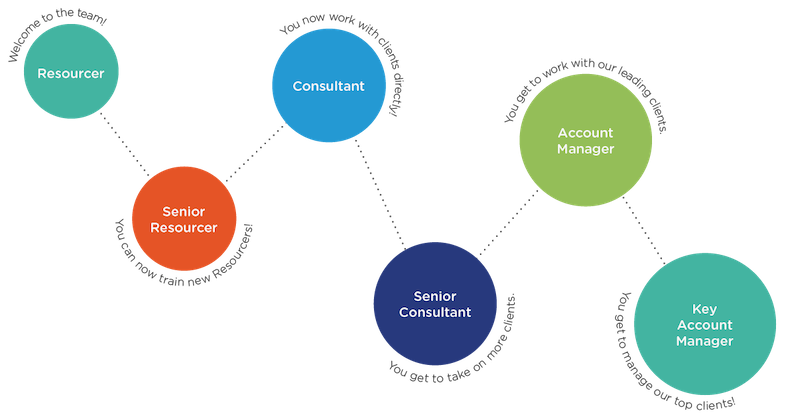What is a Recruitment Consultant?
Here’s what might be included in a Recruitment Consultant job description, so you can get a quick insight into what a Recruitment Consultant does.
- Recruitment Consultants will either work for a recruitment agency serving multiple clients or work In-house and cover the internal hiring needs of a single company.
- Working for an agency is often the most popular choice among graduates, as there is often lots of variety on the range of roles and clients they can work on.
- Recruitment Consultants play a vital link in the hiring process between candidates and clients, they work to create great relationships and understand both of their needs.
- Their ultimate goal is to place suitable candidates in the right professional job.
What is a Trainee Recruitment Consultant?
In many recruitment careers, you would start in a trainee recruitment position, or as we call it at Give A Grad A Go Recruitment, a ‘Resourcer’.
Resourcers begin learning the basics of recruitment, starting with finding and ‘profiling’ suitable candidates for different roles.
What is a 360 Recruitment Consultant?
A 360 Recruitment Consultant involves handling the whole recruitment process cycle from start to finish.
This includes job description writing and other preparations, sourcing suitable candidates, screening CVs, carrying out phone interviews, selecting the most appropriate applicants, sometimes holding face-to-face interviews or organising assessment days, providing feedback, hiring and onboarding candidates for each job.
What is a Graduate Recruitment Consultant?
A Graduate Recruitment Consultant is someone that recruits university graduates into various job roles, and will often work for a sector specific agency, for example, Graduate Recruitment Consultants working here at Give A Grad A Go, the UK’s leading Graduate Recruitment Agency.
What does a Recruitment Consultant do on a daily basis?
So, what is a Recruitment Consultant job like? Recruitment jobs are varied, covering multiple areas from sales, business development, marketing and networking.
Here are some of the typical tasks a Recruitment Consultant carries out daily:
In many recruitment agencies, you’ll begin as a Resourcer and when you progress to a Recruitment Consultant, you’ll be a 360 Recruitment Consultant. This involves managing the whole recruitment process from start to finish, from sourcing candidates to arranging interviews and organising offers.
-
Write and ‘optimise’ job descriptions
As well as writing and editing, it’s also important to ‘optimise’ job descriptions, to ensure they have all the key elements needed to appeal to candidates and get some good applications.
For example, using certain ‘buzz words’ to attract a certain audience and ensure that the job role can be easily found by candidates searching on job boards or Google.
-
Recruitment Consultant training opportunities
At Give a Grad a Go we have regular Resourcer and Recruitment Consultant training, whereby external trainers come into the office and hold group and individual one-to-one recruitment training sessions and new employees would receive a Recruitment Consultant training manual.
Get in touch today if you’d like to know more about working for us.
-
Candidate screening process
Recruitment Consultants often begin working alongside a Candidate Resourcer to source suitable candidates for the role.
Once candidates have registered with the recruitment agency and applied for jobs, the Recruitment Consultant will then screen these candidates on the phone and send the client the selected candidates’ CVs to see if they are suitable for the role.
-
‘Sell’ the job role to candidates
The sales aspect of Recruitment Consultancy comes into play as consultants will then pitch the role to candidates the client would like to interview, highlighting the benefits and why they should interview there.
-
Arrange and schedule interviews
A Recruitment Consultant will then arrange the interview stage, liasing with both the employer and candidates, as well as helping to prepare candidates for their interviews.
You would then be required to inform candidates if they’ve been successful or not, as well as providing feedback.
-
Regular communication between clients and candidates
A Recruitment Consultant is constantly in touch with both candidates and clients, asking for feedback from each and relaying it to the other.
A Recruitment Consultant’s day will often be centred and structured around the clients’ needs, and a successful Recruitment Consultant will need to adapt to these.
Clients may change a job specification last minute, or ask for more candidates to be put forward for a role and expect a quick turnaround of new candidates to interview.
-
Client meetings, nurturing existing relationships
A central part of their role is finding out the needs of both the client and candidate so that they can successfully deliver a great service to each.
Recruitment Consultants will often visit clients at their offices to build a great relationship and find out about their upcoming hiring plans, as well as getting to know the company.
-
Finding and developing new business
Whilst some recruitment agencies have their own business development teams, part of a Recruitment Consultant’s role may also involve identifying new sales leads and contacting potential clients to acquire new business.
Many recruitment agencies have Recruitment Consultant KPI targets for staff to work towards, with different rewards for hitting targets such as monetary bonuses, commission and other prizes.









